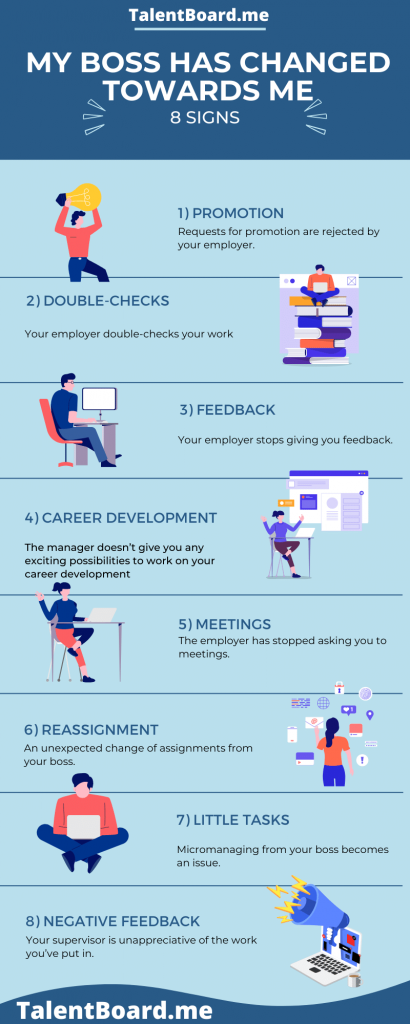Working relationships are essential for a positive corporate climate and contented employees. An employee may believe that their employer is ignoring them from time to time, which can have a negative effect on the workplace culture.
It’s critical to know why this happens so that you can respond professionally. It is our hope that this post will help you understand why your supervisor is avoiding you, as well as supply you with a few useful hints.
Contacting Current Employer without Permission [The Answer]
My boss has changed towards me : Signs
Instead of turning each day into a horrible marathon that starts all over the next morning again, managers that are happy with their staff can make their employees’ work weeks far more meaningful, and maybe even fun.
In addition to helping you advance in your career, a content supervisor is more likely to reward you with a promotion or pay increase.
Here are some telltale signals that your manager has changed his or her attitude toward you.
- Requests for promotion are rejected by your employer.
- Your employer double-checks your work.
- Your employer stops giving you feedback.
- The manager doesn’t give you any exciting possibilities to work on your career development.
- The employer has stopped asking you to meetings.
- Micromanaging from your boss becomes an issue.
- Your supervisor is unappreciative of the work you’ve put in.
- Your superior refuses to let you in on any of the company’s inner workings.
- An unexpected change of assignments from your boss.
- Your manager pays attention to the time and date.

Possible reasons for that change

Many factors can cause you to believe that your manager isn’t interested in you. Reflect on the possible causes of this so that you can decide what your next step should be.
It’s possible that your boss’s avoidance has a good reason. For the following reasons:
- Your employer is obsessive about the fine print.
- It’s hard for your supervisor to keep up.
- Your supervisor has a number of pressing concerns.
- There’s a chance that your employer is dealing with personal difficulties of their own.
- Your manager may be dissatisfied with your work.
- You’re no longer given assignments that are novel, interesting, or mentally taxing.
- You are not given assistance in advancing your professional career.
- Your day-to-day activities are micromanaged.
- It seems like you’ve been left out of the loop.
- Benefits or employment responsibilities have shifted.
- Your manager fails to acknowledge or belittle your achievements.
- Everything you do should be documented.
- Your supervisor is preventing you from speaking with coworkers.
- It appears that the firm is making preparations without you in mind.
When Is It Too Late To Cancel An Interview?
How to deal with it?
As a result of the way your supervisor is behaving, you may be concerned about your job security or future employment opportunities.
Here are some pointers on how to deal professionally with a supervisor who behaves in an unexpected manner toward you if you find yourself in this position and are unclear about what to do.
How to Tell Your Boss You’re Vomiting?
Talk to your supervisor
If you see that your supervisor is acting differently toward you, the best course of action is to have a frank conversation with him or her.
Think about raising the issue the next time you meet with your supervisor; if necessary, plan a time to meet and address it if it’s urgent.
It’s time to take a closer look at your own
As a result of your chat with your supervisor, it’s time to evaluate your actions and determine whether or not you should make any alterations.
Depending on your unique circumstances with your supervisor, you may or may not be able to do something about it.
Try to comprehend your boss’s rationale
You should strive to understand your manager’s motivations before addressing them. See if you can put yourself in their shoes and see things from their point of view.
When speaking with your manager, you can better express empathy if you put this technique to use.
Talk to the Human Resources Department
After communicating with your boss or if speaking to your boss isn’t an option, you might use your human resources department as the following steps.
Human resources are there to aid with any employee concern, from perks to communication, so they’re there.
Everything vital should be recorded
Always keep a record of everything you do to safeguard your job and your reputation if things with your boss aren’t going well.
To some, this may seem like an extreme precaution, but you never know when you’ll be required to give proof of the jobs or projects you’re working on.
Consider looking for a new job
The most extreme and preferably last resort option when you notice that your boss has shifted towards you is to hunt for new employment.
If he or she treats you disrespectfully or you have the feeling that you will be dismissed soon, you should consider taking this action.
Take charge at work
If you want your boss to notice you, you may want to take a more proactive approach at work. If you start speaking up in meetings or offering to help out with more projects, your manager might notice this change. This may be able to address any issues you may be having at work.
My Main Reason for Working is to Earn a Paycheck [Guide]
Your messages need to be reworded
Try rephrasing your emails if you’re getting no response from your management. Consider sending them an instant message or contacting them when they’re in their office.
Your manager may be able to appreciate the value you provide to the team if you present your knowledge in a new way.
Keep an optimistic frame of mind
If your boss has a different outlook, keeping a positive frame of mind could ease tensions. Try to show them how you would like to be treated if you were in their shoes.
There is a chance that the way you behave and speak will allow your boss to realize that their encounters with you are more favorable.
No Mention Of Drug Tests In A Job Offer [No Test ?]
Schedule regular meetings
If meeting with your manager is becoming difficult, you might want to suggest setting up more frequent meetings.
As a result, your boss will be able to respond to your inquiries and provide feedback on your work at designated times. Your manager may benefit from scheduling regular meetings to keep their leadership style on the track.
[Guide] Should I include therapy on my resume?
The root of the problem must be addressed
In the event of a conflict at work, it’s critical to identify and fix the root cause. This helps you build a meaningful remedy that can avoid the problem from repeating.
Addressing the issue allows your manager to clarify their perspective and allows you to explain yours. A productive working connection can be fostered by attempting to comprehend the viewpoints of the other party.
Frequently Asked Questions (FAQ)
- What should I do if my boss is acting weird?
If you notice a sudden change in your boss’ behavior or attitude towards you, it may be a cause for concern. You can try talking to your boss to see if there’s anything affecting their behavior or if there’s anything you can do to help. However, if the behavior continues or escalates, it may be necessary to involve HR.
- How do I improve my relationship with my boss?
Building a good relationship with your boss takes time and effort. Some ways to improve your relationship include: regularly communicating with your boss, being proactive and taking initiative, showing a positive attitude, and being open to feedback and criticism.
- What are some signs my boss may be unhappy with my work?
Some signs to look out for include: lack of feedback or praise, micromanaging, avoidance of communication, and decreased responsibility or workload. However, it’s important not to jump to conclusions and to communicate with your boss to clarify any issues.
- What can I do if I’m unhappy with my boss?
If you’re unhappy with your boss, the first step is to try to address any issues with them directly. If this proves unsuccessful, you may want to consider speaking with HR or seeking a new job.
- How do I handle a difficult coworker?
If you have a difficult coworker, it’s important to remain professional and respectful. Try to communicate with them and address any issues directly, but if the behavior continues or escalates, it may be necessary to involve your boss or HR.
- What should I do if I don’t trust my boss?
If you don’t trust your boss, it can be difficult to work effectively together. Try to identify any specific issues that are causing your lack of trust and address them with your boss. If the situation doesn’t improve, it may be necessary to involve HR or consider seeking a new job.
- How do I get feedback from my boss?
It’s important to regularly seek feedback from your boss to improve your performance. You can schedule regular check-ins or ask for feedback after completing a project or task. Ask specific questions about what you did well and where you can improve.
- How do I prepare for a meeting with my boss?
To prepare for a meeting with your boss, make sure you have a clear agenda and objectives.
Working relationships are essential for a positive corporate climate and contented employees. An employee may believe that their employer is ignoring them from time to time, which can have a negative effect on the workplace culture.
It’s critical to know why this happens so that you can respond professionally. It is our hope that this post will help you understand why your supervisor is avoiding you, as well as supply you with a few useful hints.
Sources :
https://www.cnbc.com/2017/05/28/5-signs-youre-working-for-a-toxic-boss-and-5-tips-tohelp.html
https://www.forbes.com/sites/jacquelynsmith/2013/07/10/10-tips-for-dealing-with-an-overlydemanding-boss/?sh=581ab96164bc
Knippen, J., & Green, T. (1997). Giving positive reinforcement to your boss: how to change your
boss. Journal Of Workplace Learning, 9(6), 192-194. doi: 10.1108/13665629710180401
Dealing with different boss types at work.
Webster, C. (2017). Childminders benefit from working to help each other. Early Years Educator,
19(7), 26-28. doi: 10.12968/eyed.2017.19.7.26